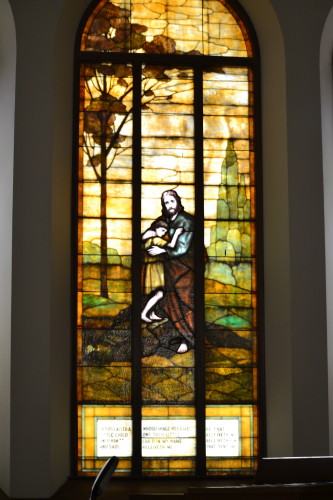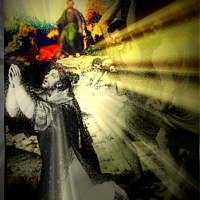(I was off from preaching last week, but to keep up with our study from Acts, here is a bit of a devotional on last week’s Scripture passage. Enjoy!)
Acts 11:19 Now those who had been scattered by the persecution in connection with Stephen traveled as far as Phoenicia, Cyprus and Antioch, telling the message only to Jews. 20 Some of them, however, men from Cyprus and Cyrene, went to Antioch and began to speak to Greeks also, telling them the good news about the Lord Jesus. 21 The Lord’s hand was with them, and a great number of people believed and turned to the Lord. 22 News of this reached the ears of the church at Jerusalem, and they sent Barnabas to Antioch. 23 When he arrived and saw the evidence of the grace of God, he was glad and encouraged them all to remain true to the Lord with all their hearts. 24 He was a good man, full of the Holy Spirit and faith, and a great number of people were brought to the Lord. 25 Then Barnabas went to Tarsus to look for Saul, 26 and when he found him, he brought him to Antioch. So for a whole year Barnabas and Saul met with the church and taught great numbers of people. The disciples were called Christians first at Antioch. 27 During this time some prophets came down from Jerusalem to Antioch. 28 One of them, named Agabus, stood up and through the Spirit predicted that a severe famine would spread over the entire Roman world. (This happened during the reign of Claudius.) 29 The disciples, each according to his ability, decided to provide help for the brothers living in Judea. 30 This they did, sending their gift to the elders by Barnabas and Saul.
* * *
The name “Christian” brings up all kinds of thoughts. To those who are Christian, it’s a title proudly embraced because it identifies us with our Savior and encourages us to follow Jesus Christ. To those outside the Christian community, however, it brings up all kinds of other thoughts. For some, the title Christian means we’re hypocrites and Bible-thumpers. To others, we’re the enemy of modern culture. We’re enforcers of rules. The morality police. The gnarled finger-pointers, always out there ruining everyone’s fun…or trying to. We’re the people they avoid at parties because we seem to be God-ordained buzz-kills.
Certainly our culture is presently engaged in an all-out war against Christianity because our God poses the biggest threat. Why? Because deep down, people who hate God all kind of know that our God is the One True God and they resent His existence.
Jesus said, John 15:18 “If the world hates you, keep in mind that it hated me first. 19 If you belonged to the world, it would love you as its own. As it is, you do not belong to the world, but I have chosen you out of the world. That is why the world hates you. 20 Remember the words I spoke to you: ‘No servant is greater than his master.’ If they persecuted me, they will persecute you also. If they obeyed my teaching, they will obey yours also. 21 They will treat you this way because of my name, for they do not know the One who sent me. 22 If I had not come and spoken to them, they would not be guilty of sin. Now, however, they have no excuse for their sin. 23 He who hates me hates my Father as well. 24 If I had not done among them what no one else did, they would not be guilty of sin. But now they have seen these miracles, and yet they have hated both me and my Father. 25 But this is to fulfill what is written in their Law: ‘They hated me without reason.’ 26 “When the Counselor comes, whom I will send to you from the Father, the Spirit of truth who goes out from the Father, he will testify about me. 27 And you also must testify, for you have been with me from the beginning.
No one is out there persecuting followers of Allah/the prophet Muhammad, except perhaps other followers of Allah/the prophet Muhammad (go figure!). No one is out there persecuting Mormons or Jehovah’s Witnesses or Buddhists or Hindus. But say the word Christian (or Jew), and suddenly the world is against you. Jews have been persecuted far longer than Christians, but we ought to belong to the same club, even if many of my Jewish friends don’t yet realize Jesus is their long-awaited Messiah.
But one thing we can say about genuine Christians is that we need to stick together and help each other. That’s how it’s been since Christians were first called Christian. And it happened first at Antioch.
In today’s passage of Scripture, there are a few notable things about that happening place called Antioch.
- Antioch was the place where Jews and Gentiles heard the Gospel preached with equal eagerness. And God grew their numbers for it, particularly among the Gentiles.
- It got the attention of the Church in Jerusalem since they began to see how God was expanding the Gospel to the Gentile world, literally the ends of their known earth. Just as Jesus said.
- Barnabas who had been an instrumental encourager of Paul/Saul was commissioned to check it out and make sure it was legit. And it was.
- Luke records for us that Christians were first called that at Antioch, and notably only after both Jews and Gentiles stood on level ground at the foot of the Cross. Gentiles were not called Christian while Jews were still Jews with a little Jesus accessorizing. They weren’t 2 co-equal but totally separate branches of God-fearers. Jews were not called Christian as a replacement for their Judaism. They were simultaneously fully Jewish by birth and as followers of Jesus, fully Christian, by being born again into a completed faith.
- Christians aren’t Christian in name only. They show their Christianity by what they do. In this case, Christians (having heard that a famine was coming) rallied together to provide for the neediest among them: those back in Judea whose Christianity may have cost them their livelihood or whose sheer numbers of widows and orphans were greatest. The persecution was real and the consequences for those in Judea were dire, especially since the scattering of the believing community left them without safety in numbers. The believers remaining in Judea were at the epicenter of persecution and needed help from the larger body.
Questions for further thought:
- So where are you today? Are you a Christian in name only or do you show your faith by what you do? (James 2:18)
- Divide and conquer is typically a sure-fire strategy for defeating the ones divided. Scattering geographically divided the Body of Christ by space and location.
 Yet, those bold believers found a way to continually preach the Good News and that created new community wherever they went. (Luke 8:16)
Yet, those bold believers found a way to continually preach the Good News and that created new community wherever they went. (Luke 8:16) - In our day and age, geography isn’t how we’re scattered. We’re alone in a crowd. Our faith has been driven inward—it has become privatized. How is this more effective at dividing and defeating us? How does individualism (division by space and location) seek to destroy the idea of community (Hebrews 10:25)? How does privatized Christianity disguise our numbers?
- Why do you think that the community of faith wasn’t called Christian until it was both Jews and Gentiles (non-Jews)?
 The Holy Spirit being poured out even on the Gentiles. It’s sometimes called the Gentile Pentecost. The circumcised believers (that is the Jewish Christians with Peter) and Peter himself were all astonished that Gentiles received the Holy Spirit. Remember all the way back when the Church first began with the coming of the Holy Spirit back in Acts 2? That same deal has just happened to those unworthy Gentiles.
The Holy Spirit being poured out even on the Gentiles. It’s sometimes called the Gentile Pentecost. The circumcised believers (that is the Jewish Christians with Peter) and Peter himself were all astonished that Gentiles received the Holy Spirit. Remember all the way back when the Church first began with the coming of the Holy Spirit back in Acts 2? That same deal has just happened to those unworthy Gentiles. Isaiah 42:6 “I, the LORD, have called you in righteousness; I will take hold of your hand. I will keep you and will make you to be a covenant for the people and a light for the Gentiles, 7 to open eyes that are blind, to free captives from prison and to release from the dungeon those who sit in darkness
Isaiah 42:6 “I, the LORD, have called you in righteousness; I will take hold of your hand. I will keep you and will make you to be a covenant for the people and a light for the Gentiles, 7 to open eyes that are blind, to free captives from prison and to release from the dungeon those who sit in darkness
 Well, today it is Mother’s Day and I would like to begin by acknowledging a few things. First, this is not a Christian holiday. It’s not in our Bibles. It’s a secular holiday, but it’s one that pastors and preachers are wise to mention if they want to stay on the good side of Moms everywhere.
Well, today it is Mother’s Day and I would like to begin by acknowledging a few things. First, this is not a Christian holiday. It’s not in our Bibles. It’s a secular holiday, but it’s one that pastors and preachers are wise to mention if they want to stay on the good side of Moms everywhere. Acts 10 is rich with all kinds of important theological truths if only we read for understanding of the hidden gems of truth.
Acts 10 is rich with all kinds of important theological truths if only we read for understanding of the hidden gems of truth. Ray Kinsela is the Iowa farmer in the movie Field of Dreams who plows under his corn crop to build a baseball field when he hears the voice saying “If you build it, he will come.” So he does it and goes out to meet the author Terence Mann who he’s supposed to take to a baseball game at Fenway Park. When Mann asks him, “Why go through with it?”, Kinsela says “It’s a long story. But it’s a good one.”
Ray Kinsela is the Iowa farmer in the movie Field of Dreams who plows under his corn crop to build a baseball field when he hears the voice saying “If you build it, he will come.” So he does it and goes out to meet the author Terence Mann who he’s supposed to take to a baseball game at Fenway Park. When Mann asks him, “Why go through with it?”, Kinsela says “It’s a long story. But it’s a good one.” 4 He fell to the ground and heard a voice say to him, “Saul, Saul, why do you persecute me?” 5 “Who are you, Lord?” Saul asked. “I am Jesus, whom you are persecuting,” he replied. 6 “Now get up and go into the city, and you will be told what you must do.” 7 The men traveling with Saul stood there speechless; they heard the sound but did not see anyone. 8 Saul got up from the ground, but when he opened his eyes he could see nothing. So they led him by the hand into Damascus. 9 For three days he was blind, and did not eat or drink anything. 10 In Damascus there was a disciple named Ananias. The Lord called to him in a vision, “Ananias!” “Yes, Lord,” he answered. 11 The Lord told him, “Go to the house of Judas on Straight Street and ask for a man from Tarsus named Saul, for he is praying. 12 In a vision he has seen a man named Ananias come and place his hands on him to restore his sight.” 13 “Lord,” Ananias answered, “I have heard many reports about this man and all the harm he has done to your saints in Jerusalem. 14 And he has come here with authority from the chief priests to arrest all who call on your name.” 15 But the Lord said to Ananias, “Go! This man is my chosen instrument to carry my name before the Gentiles and their kings and before the people of Israel. 16 I will show him how much he must suffer for my name.” 17 Then Ananias went to the house and entered it. Placing his hands on Saul, he said, “Brother Saul, the Lord– Jesus, who appeared to you on the road as you were coming here– has sent me so that you may see again and be filled with the Holy Spirit.” 18 Immediately, something like scales fell from Saul’s eyes, and he could see again. He got up and was baptized, 19 and after taking some food, he regained his strength. Saul spent several days with the disciples in Damascus. 20 At once he began to preach in the synagogues that Jesus is the Son of God. 21 All those who heard him were astonished and asked, “Isn’t he the man who raised havoc in Jerusalem among those who call on this name? And hasn’t he come here to take them as prisoners to the chief priests?” 22 Yet Saul grew more and more powerful and baffled the Jews living in Damascus by proving that Jesus is the Christ. 23 After many days had gone by, the Jews conspired to kill him, 24 but Saul learned of their plan. Day and night they kept close watch on the city gates in order to kill him. 25 But his followers took him by night and lowered him in a basket through an opening in the wall. 26 When he came to Jerusalem, he tried to join the disciples, but they were all afraid of him, not believing that he really was a disciple. 27 But Barnabas took him and brought him to the apostles. He told them how Saul on his journey had seen the Lord and that the Lord had spoken to him, and how in Damascus he had preached fearlessly in the name of Jesus. 28 So Saul stayed with them and moved about freely in Jerusalem, speaking boldly in the name of the Lord. 29 He talked and debated with the Grecian Jews, but they tried to kill him. 30 When the brothers learned of this, they took him down to Caesarea and sent him off to Tarsus. 31 Then the church throughout Judea, Galilee and Samaria enjoyed a time of peace. It was strengthened; and encouraged by the Holy Spirit, it grew in numbers, living in the fear of the Lord.
4 He fell to the ground and heard a voice say to him, “Saul, Saul, why do you persecute me?” 5 “Who are you, Lord?” Saul asked. “I am Jesus, whom you are persecuting,” he replied. 6 “Now get up and go into the city, and you will be told what you must do.” 7 The men traveling with Saul stood there speechless; they heard the sound but did not see anyone. 8 Saul got up from the ground, but when he opened his eyes he could see nothing. So they led him by the hand into Damascus. 9 For three days he was blind, and did not eat or drink anything. 10 In Damascus there was a disciple named Ananias. The Lord called to him in a vision, “Ananias!” “Yes, Lord,” he answered. 11 The Lord told him, “Go to the house of Judas on Straight Street and ask for a man from Tarsus named Saul, for he is praying. 12 In a vision he has seen a man named Ananias come and place his hands on him to restore his sight.” 13 “Lord,” Ananias answered, “I have heard many reports about this man and all the harm he has done to your saints in Jerusalem. 14 And he has come here with authority from the chief priests to arrest all who call on your name.” 15 But the Lord said to Ananias, “Go! This man is my chosen instrument to carry my name before the Gentiles and their kings and before the people of Israel. 16 I will show him how much he must suffer for my name.” 17 Then Ananias went to the house and entered it. Placing his hands on Saul, he said, “Brother Saul, the Lord– Jesus, who appeared to you on the road as you were coming here– has sent me so that you may see again and be filled with the Holy Spirit.” 18 Immediately, something like scales fell from Saul’s eyes, and he could see again. He got up and was baptized, 19 and after taking some food, he regained his strength. Saul spent several days with the disciples in Damascus. 20 At once he began to preach in the synagogues that Jesus is the Son of God. 21 All those who heard him were astonished and asked, “Isn’t he the man who raised havoc in Jerusalem among those who call on this name? And hasn’t he come here to take them as prisoners to the chief priests?” 22 Yet Saul grew more and more powerful and baffled the Jews living in Damascus by proving that Jesus is the Christ. 23 After many days had gone by, the Jews conspired to kill him, 24 but Saul learned of their plan. Day and night they kept close watch on the city gates in order to kill him. 25 But his followers took him by night and lowered him in a basket through an opening in the wall. 26 When he came to Jerusalem, he tried to join the disciples, but they were all afraid of him, not believing that he really was a disciple. 27 But Barnabas took him and brought him to the apostles. He told them how Saul on his journey had seen the Lord and that the Lord had spoken to him, and how in Damascus he had preached fearlessly in the name of Jesus. 28 So Saul stayed with them and moved about freely in Jerusalem, speaking boldly in the name of the Lord. 29 He talked and debated with the Grecian Jews, but they tried to kill him. 30 When the brothers learned of this, they took him down to Caesarea and sent him off to Tarsus. 31 Then the church throughout Judea, Galilee and Samaria enjoyed a time of peace. It was strengthened; and encouraged by the Holy Spirit, it grew in numbers, living in the fear of the Lord. And they welcomed him.
And they welcomed him. Imagine one single dandelion, white with its little helicopters just waiting to take off with the nearest breeze. Lawns and neighbors quake at the sight.
Imagine one single dandelion, white with its little helicopters just waiting to take off with the nearest breeze. Lawns and neighbors quake at the sight. When Jesus calls us to be fishers of men, He doesn’t mean “keepers of the aquarium” who keep the pump and filter running and clean the algae and gunk off the walls and bottom of the tank.
When Jesus calls us to be fishers of men, He doesn’t mean “keepers of the aquarium” who keep the pump and filter running and clean the algae and gunk off the walls and bottom of the tank. At one point a young preacher went into a jail to do ministry and there was a hardened criminal there. The young preacher shared the Gospel with him and when the criminal prayed to receive Christ as his Lord and Savior, he turned to the young man and said, “Don’t go getting a big head. You’re number 25.” There were 24 others before him who prepared the way ahead of him.
At one point a young preacher went into a jail to do ministry and there was a hardened criminal there. The young preacher shared the Gospel with him and when the criminal prayed to receive Christ as his Lord and Savior, he turned to the young man and said, “Don’t go getting a big head. You’re number 25.” There were 24 others before him who prepared the way ahead of him. Philip, one of the original twelve disciples of Jesus, has a controversial “Come and See” ministry. He is scattered during the persecution recorded in
Philip, one of the original twelve disciples of Jesus, has a controversial “Come and See” ministry. He is scattered during the persecution recorded in  One of the more frequent questions I get is, “What is the unforgivable sin and did I just commit it?” Related to that one, I suppose, is “Can God ever forgive me for what I’ve done?”
One of the more frequent questions I get is, “What is the unforgivable sin and did I just commit it?” Related to that one, I suppose, is “Can God ever forgive me for what I’ve done?” Acts 7:56 “Look,” he said, “I see heaven open and the Son of Man standing at the right hand of God.” 57 At this they covered their ears and, yelling at the top of their voices, they all rushed at him, 58 dragged him out of the city and began to stone him. Meanwhile, the witnesses laid their clothes at the feet of a young man named Saul. 59 While they were stoning him, Stephen prayed, “Lord Jesus, receive my spirit.” 60 Then he fell on his knees and cried out, “Lord, do not hold this sin against them.” When he had said this, he fell asleep.”
Acts 7:56 “Look,” he said, “I see heaven open and the Son of Man standing at the right hand of God.” 57 At this they covered their ears and, yelling at the top of their voices, they all rushed at him, 58 dragged him out of the city and began to stone him. Meanwhile, the witnesses laid their clothes at the feet of a young man named Saul. 59 While they were stoning him, Stephen prayed, “Lord Jesus, receive my spirit.” 60 Then he fell on his knees and cried out, “Lord, do not hold this sin against them.” When he had said this, he fell asleep.”